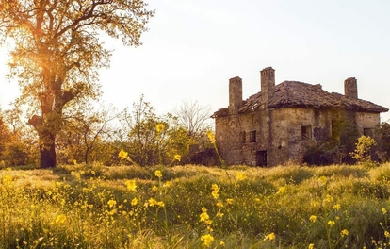All's Well
WHAT dost thou here, young wife, by the water-side,
Gathering crimson dulse?
Know’st thou not that the cloud in the west glooms wide,
And the wind has a hurrying pulse?
Peaceful the eastern waters before thee spread,
And the cliffs rise high behind,
While thou gatherest sea-weeds, green and brown and red,
To the coming trouble blind.
She lifts her eyes to the top of the granite crags,
And the color ebbs from her cheek,
Swift vapors skurry the black squall’s tattered flags,
And she hears the gray gull shriek.
And like a blow is the thought of the little boat
By this on its homeward way,
A tiny skiff, like a cockle-shell afloat
In the tempest-threatened bay;
With husband and brother who sailed away to the town
When fair shone the morning sun,
To tarry but till the tide in the stream turned down,
Then seaward again to run.
Homeward she flies; the land-breeze strikes her cold;
A terror is in the sky;
Her little babe with his tumbled hair of gold
In her mother’s arms doth lie.
She catches him up with a breathless, questioning cry:
“O mother, speak! Are thy near?”
“Dear, almost home. At the western window high
Thy father watches in fear.”
She climbs the stair: “O father, must they be lost?”
He answers never a word;
Through the glass he watches the line the squall has crossed
As if no sound he heard.
And the Day of Doom seems come in the angry sky,
And a low roar fills the air;
In an awful stillness the dead-black waters lie,
And the rocks gleam ghastly and bare.
Is it a snow-white gull’s wing fluttering there,
In the midst of that hush of dread?
Ah, no, 't is the narrow strip of canvas they dare
In the face of the storm to spread.
A moment more and all the furies are loose,
The coast line is blotted out,
The skiff is gone, the rain-cloud pours its sluice,
And she hears her father shout,
“Down with your sail!” as if through the tumult wild,["]
And the distance, his voice might reach;
And, stunned, she clasps still closer her rosy child,
Bereft of the power of speech.
But her heart cries low, as writhing it lies on the rack,
“Sweet, art thou fatherless?”
And swift to her mother she carries the little one back,
Where she waits in her sore distress.
Then into the heart of the storm she rushes forth;
Like leaden bullets the rain
Beats hard in her face, and the hurricane from the north
Would drive her back again.
It splits the shingles off the roof like a wedge,
It lashes her clothes and her hair,
But slowly she fights her way to the western ledge,
With the strength of her despair.
Through the flying spray, through the rain-cloud’s shattered stream,
What shapes in the distance grope,
Like figures that haunt the shore of a dreadful dream?
She is wild with a desperate hope.
Have pity, merciful Heaven! Can it be?
Is it no vision that mocks?
From billow to billow the headlong plunging sea
Has tossed them high on the rocks;
And the hollow skiff like a child’s toy lies on the ledge
This side of the roaring foam,
And up from the valley of death, from the grave’s drear edge,
Like ghosts of men they come!
Oh sweetly, sweetly shines the sinking sun,
And the storm is swept away;
Piled high in the east are the cloud-heaps purple and dun,
And peacefully dies the day.
But a sweeter peace falls soft on the grateful souls
In the lonely isle that dwell,
And the whisper and rush of every wave that rolls
Seem murmuring, “All is well.”


